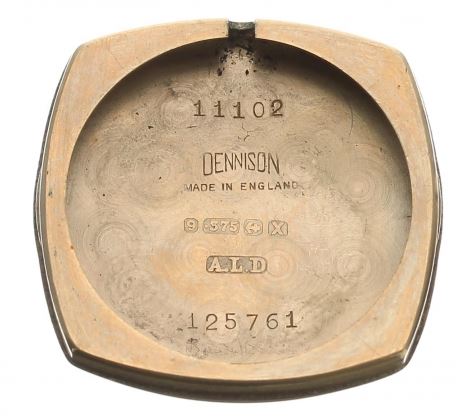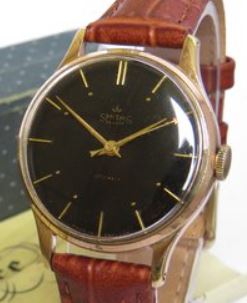Last Updated on April 10, 2024 by Jason
Aaron Lufkin Dennison (1812 – 1895) was an American-born watchmaker. In 1874, he founded the very successful Dennison Watch Case Company in Birmingham, England. Originally, the company was called Dennison, Wigley & Company. It operated from a small workshop on the side of the Dennison family home. Over time it grew to produce 100,000 high-quality watch cases per year. Dennison died in 1895, and he was succeeded in business by his son, Franklin Dennison. The company was renamed the Dennison Watch Case Company Ltd in 1905 and continued as a successful business until 1967.

Aaron Lufkin Dennison
Aaron Lufkin Dennison was an American, born in Freeport, Maine in 1812, the son of a boot and shoemaker. His industrious nature emerged early, as he engaged in various menial jobs to earn pocket money. At 18, he apprenticed under clockmaker James Cary, completing his training at 21. Dennison then ventured to Boston, declining a partnership offer with Cary. At the age of 21, Dennison had completed his apprenticeship, declined the offer of a partnership with Cary and went to Boston to further his career. In 1834, he established his own watch repair business, which only lasted two years before joining Jones, Low & Ball as a watch repairer. At Jones, Low & Ball he learned about the English and Swiss methods of manufacturing.
In 1840, Dennison was still repairing watches. However, he had begun to consider manufacturing his own watches. The plan was to make watches using interchangeable parts, rather than building each watch by hand. It took a few years for this idea to come to fruition. In 1849 he approached the company of Howard & Davis, with his idea of a mechanised manufacturing process for watches. Although Dennison was the only person with any knowledge of watchmaking, the offer was accepted and the business launched in 1850. The firm was called Dennison, Howard & Davis and a factory was built in Roxbury, Massachusetts.
Failures
It wasn’t a success, partly due to Dennison’s lack of skills as a machinist. The company went bankrupt in 1854. As a result of the bankruptcy, the company was split into two parts. Some of the machinery and skilled workforce returned to Roxbury and formed the Howard Watch Company. The buildings and immovable machinery were sold to a watch manufacturer by the name of Tracey Baker & Company. Dennison remained in Waltham, working for the new company as a superintendent. He remained there until 1861.
In 1864 Dennison set up another business, the Tremont Watch Company in Boston. His idea was to purchase the delicate components from Swiss manufacturers where costs were lower. The larger components he would produce in America. Dennison left a business partner in charge in Boston and moved to Zurich to oversee the Swiss operations. Again, the company was not a success, The Tremont Watch Company fell into financial difficulties and failed in 1870.
Success at last
In 1871, Dennison moved to Birmingham, England, where he continued to be involved in watchmaking. In 1874, he identified a gap in the market for high-quality watch cases produced in large numbers and started a company. He patented many designs for air and watertight cases. Finally, after several failures, Dennison had found his niche.
The company made cases from different materials including silver, gold. filled-gold and rolled-gold. They were of such quality, that they became the preferred choice for prestigious watch brands like Rolex, Omega, and Longines. The Dennison Watch Case Company also registered trademarks for other cases, such as Cuprel, Aquatite and Denisteel. The Dennison Watch Case Company failed in February 1967 due to insolvency and the factory in Birmingham ceased production.
Related content
The Dennison Watch Case Company at Time Worn Watches.
